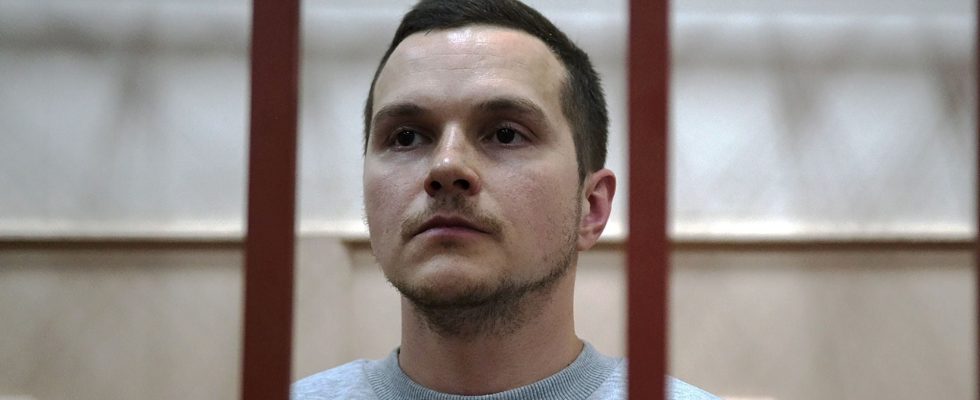“Extremism” has always had vague contours in Vladimir Putin’s regime. Extremists have been Jehovah’s Witnesses, political opponents, activists of the LGBT cause, ecological or anti-corruption activists… Since October 13, it is the profession of lawyer which, in turn, is proof “extremism”. On this date, and within a few hours of each other, three lawyers, current or former, of Alexeï Navalny, were targeted by searches and arrested.
The prosecution requests their pre-trial detention, which the judge hastens to approve. Igor Sergunin, Vadim Kobzon and Alexei Liptzer are accused of “participation in an extremist organization”. On November 16, Rosfinmonitoring, the Russian financial watchdog, included all three on its list of “terrorists and extremists” people. They risk heavy prison sentences.
One would have thought that Russian civil society – or what remains of it – would be accustomed to seeing repression constantly reach new levels. But “we didn’t expect them to go that far”, testifies Ivan Zhdanov, director of the Anti-Corruption Fund, Alexeï Navalny’s organization which continues its activities in exile, “it’s madness”.
Defending Nawalny, an “extremist” act
However, this is not the first time that Vladimir Putin’s regime has attacked lawyers. In 2021, Ivan Pavlov, defender of a journalist accused of espionage and head of “First Bureau”, a group of lawyers committed to human rights, was himself the target of a criminal investigation and forced to leave the country. A few months earlier, the “Komanda 29” lawyers’ association, which he founded in 2015, had been declared “undesirable” and several of its members accused of “foreign agents”. But in all these examples, underlines Ivan Zhdanov, the Russian authorities had invented some pretext, whether it was fictitious links with foreign countries or cases of corruption, which were equally non-existent. “But this time, they are no longer hiding. It is the very act of defending Alexei Navalny that is considered extremism.”
The case sets a dangerous precedent, even though the legal profession in Russia has always been complex. In a judicial system which sentences the accused in almost all cases, the role of the lawyer is to obtain the lightest sentence possible, to manage to make arrangements with judges and prosecutors to ensure, for example , that his client be sentenced only to a sentence without imprisonment.
In the specific case of political trials, it is not only the conviction, but also the prison sentence which, very often, is a foregone conclusion. The role of the lawyer is then different. “From a legal point of view, the lawyer is of little use to a political prisoner,” recognizes Natalia Morozova, lawyer for the Memorial human rights center, also forced into exile. But on a practical level, the lawyer plays a central role in the life of a prisoner, because he cannot be prohibited from going to see him in prison, unlike the family and doctors, who are subject to the goodwill of the prisoner. judges, police officers and the prison administration. For the detainee, lawyers therefore often represent the last link with the outside world. They give him the latest news, because he often has no source of information – just, at best, state television.”
Send messages
Conversely, the lawyer is also the only way for a prisoner to send messages to the outside world. “He can report torture, ill-treatment or a lack of medicine,” explains Natalia Morozova. “The lawyer can improve his conditions of detention, ensure that his rights are respected and give him, for example, a toothbrush,” adds Ivan Jdanov. “This may seem trivial, but it is very important.”
But this work has become dangerous. Already, very few lawyers agreed to take on political cases: from now on they will be even fewer. “It’s very difficult to find lawyers for Alexei,” laments Ivan Zhdanov. “Everyone understands that defending him means risking ending up in prison themselves. But some consider that defending Alexei is their professional duty and they do so despite the risks.” The famous opponent’s new lawyers, however, are as discreet as possible, giving few media interviews. They did not, in fact, wish to speak to L’Express.
Paper lawyers
For Natalia Morozova, the authorities’ long-term objective is to reduce lawyers “to a role of decorum”. “The Russian authorities are very attached to appearances, to making institutions appear to exist. That’s why we still have courts, elections and electoral campaigns. At the same time, they want to scare independent lawyers to leave the country or refuse to take on political cases. These will be entrusted to court-appointed lawyers who will work hand in hand with investigators and do everything they ask them.”
This vision of the future is not a fantasy. It is already a reality in a country which foreshadows what the Putin regime could soon be: Belarus. In this country, the profession of independent lawyer has practically disappeared. “The few who remain can no longer expose themselves in the media to talk about their client,” says Natalia Morozova. “They work almost clandestinely. As a result, we don’t know what happens to political prisoners. Once or twice a year, a letter comes through , and we know that he is still alive. That’s all. And that’s what awaits us.”
.
